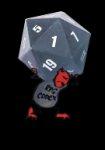
RPG Codex - Phantasie and Star Command Retrospective
RPGCodex has done another one of their retrospective interviews; this time they've talked to Winston Douglas Wood. He talks with RPG Codex about Phantasie and Star Command -
a quote about these games:
Phantasie (1985) can best be described as a dungeon crawler, but with multiple dungeons, towns and wilderness areas. Unlike many of its contemporaries, it features a top-down view in which the geography is revealed incrementally through exploration, acting as an auto-map. The game's combat is similar to Wizardry in that it is phase-based and lacks character movement, but it contains a number of attacking options such as thrusting, lunging and slashin.......
Star Command (1988) is a different beast - a sci-fi cRPG that, while retaining the classic dungeon-crawling aspect, moves on to simulate an open world space environment, striking a good balance between missions and exploration. It features an eight character party, a Traveller-esque character generation system with four different classes, each with its own class-exclusive skills, and compelling character development with a lot of choice and an involved training process........
Here's his answer about what he wanted to do when he created Phantasie:
What did you want to achieve from the creation of Phantasie? Were there things that you wanted to introduce to computer RPGs that hadn't even been approached by other games? What did you feel was missing from the genre or video games as a whole? Wizardy 1 was limited to a single dungeon with very little interaction other than combat and mapping. Ultima 1 was limited to a single character. I wanted to make a richer environment with a wider variety of places to visit: dungeons, castles, fortresses, islands, and even mythological places. I also wanted a more detailed combat system with a variety of weapons and magic. I felt that being able to have Orcs, Goblins, Trolls, Gnomes and Pixies in your party in addition to the traditional Humans, Elves, Dwarves and Halflings added a fun element as well. I also wanted more puzzles to solve by interacting with other characters and items.
Here's a quote about how he felt when he started working on Star Command:
After the conclusion of the Phantasie series you worked on Star Command, a science fiction RPG. At the time, how did you feel about switching from fantasy and mythological themes to a science fiction setting? When were your ideas for Star Command first conceived? I was excited to try something both new to me and to the computer game market. I also wanted to switch from developing for the Apple II to the PC because it was less restrictive and that market was growing while the Apple market was shrinking. Also science fiction seemed a better fit for the PC market.
Thanks Crooked Bee :)
Source: RPG Codex

